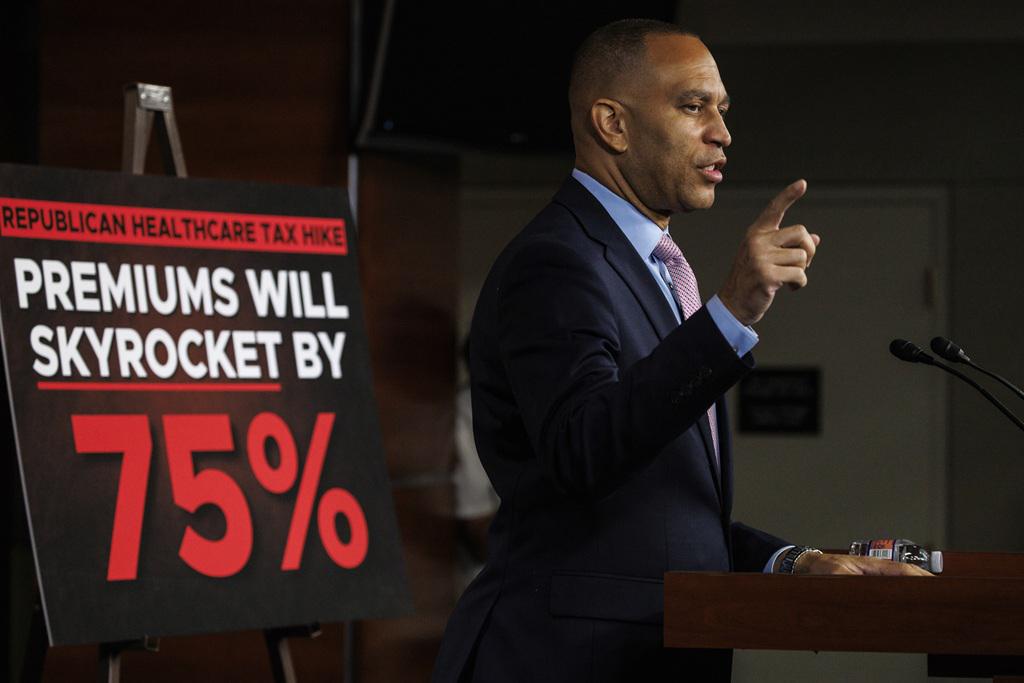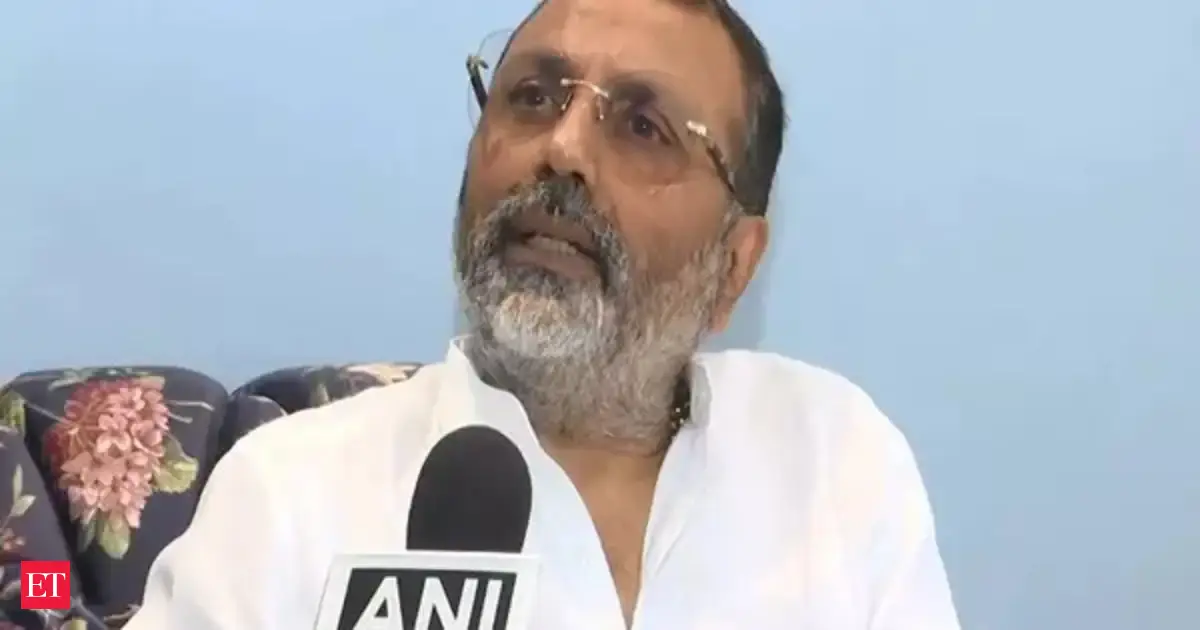By David Dayen
Copyright prospect

Democrats have now confirmed what was an open secret last week: They’re going to use their leverage in the upcoming government funding showdown, where their votes are needed to pass anything in the Senate, to ask for health care changes, in particular an extension of enhanced Affordable Care Act subsidies that expire at the end of the year. Both House Democratic Leader Hakeem Jeffries (D-NY) and Senate Democratic Leader Chuck Schumer (D-NY), along with other legislative leaders, pronounced themselves united on this, insisting that Democrats will put their imprint on the budget deal and reject any “clean” stopgap funding that is negotiated without them.
“We have broad agreement that the health of the American people should be paramount in this debate,” Rep. Richie Neal (D-MA), the Democrats’ top member of the House Ways and Means Committee, told Politico.
I’ve made my thoughts known on this. I understand the logic of presenting a straightforward message on an issue where the public trusts Democrats, and deliver something that I agree is desperately needed to prevent a huge shock to the system and millions of Americans’ sudden loss of insurance. Making the ask tangible and real, the theory goes, can galvanize support at a time when more people will be tuning in as the shutdown countdown nears. And if that’s what can unite House and Senate Democrats, and get Schumer to reject a Republican-only deal, so be it.
But to me, this exchanges something Republicans need (preventing a health insurance apocalypse that they created) with something they want (passing government funding on their terms). More important, it diminishes the urgency of the moment. The usual back-and-forth of bipartisan politics dictates that you ask for A as a condition for supporting B, and everyone gets something out of it. This is a quaint but dramatically wrong way to look at the stakes in America right now.
Today, Congress is on the verge of being totally sidelined, as President Trump misappropriates emergency powers, violating the law and usurping congressional spending powers in a bid to reinvent American government as a personalist autocracy. Presenting the upcoming battle as an event where Democrats fight for a health care provision is a woefully inadequate way to send a big flashing signal to the public about our shared reality. It normalizes something deeply abnormal.
Presenting the upcoming battle as an event where Democrats fight for a health care provision is a woefully inadequate way to send a big flashing signal to the public.
And just on the basics, Democrats are in a negotiation with Donald Trump, who has reneged on practically every negotiation in his life, including on government funding just six months ago, when he got Democrats to agree to a “clean” deal and then withheld $410 billion in grants and agency spending, at last count. How could you possibly make another deal on spending with a man who has shown active hostility to abiding by spending deals?
“If this is about traditional goodies, why should anyone care?” said Daniel Schuman, executive director of the American Governance Institute, whose hair has been on fire about this topic for months. “What it comes down to is, does Congress matter or not? Does the law matter or not? To not take a stand is to cede their authority.”
Hill sources who have spoken with the Prospect have said that behind the scenes, language designed to force adherence to any funding bill that passes is part of the conversation. But there’s a widespread belief in the caucus that talking about defending institutions and legislative procedure really amounts to losing, because in the end nobody really cares about that.
That seems thoroughly unimaginative. As Schuman pointed out to me, Americans have had the idea of checks and balances pounded into their heads since they were kids. The fact that Trump is obliterating checks and balances is not a difficult message.
Polling already shows big deficits for Trump on his deploying federal troops in American cities, defying judicial rulings, and taking over functions traditionally in the hands of independent agencies or other parts of the government. In a recent Reuters-Ipsos poll, only 39 percent of Republicans—and much smaller numbers of Democrats and independents—agreed that some checks and balances should be handed over to the chief executive. The idea that Americans are too dumb or disinterested to understand when their democracy is dwindling, in short, is not borne out by facts.
The final point some Hill staffers make is that Democrats can’t save democracy when they’re in the minority, and while it’s true that winning elections has to factor into their calculations, the party’s current stance minimizes the real powers Congress has at its disposal if it wants something to happen, or to push back on the prerogatives of the president of the United States. It’s important to lay out distinctly what those powers are, and how a serious Congress could bend a president to their will.
Call it a No Kings budget. Here’s what it could look like.
THERE ARE SEVERAL MAJOR AREAS where Trump is seizing and expanding power: taking control of budget decisions in place of Congress, denoting national emergencies so he can operate unilaterally, and deploying the military on U.S. soil, to name a few. Moreover, the Supreme Court has been handing over power to the executive, allowing this aggrandizement to go forward.
Congress, and Democrats in particular, can prevent or deter any or all of this. Of course, the president has to sign whatever comes out of Congress, but with Democrats’ ability to stop any deal on funding, they could force at least some of these provisions to be adopted.
It turns out that Schuman wrote the book on this back in February, in the early stages of Trump’s second term, in a warning to Democrats not to cave on their first attempt at government funding leverage. Most of his options still hold up, and there are more to be added.
Let’s start with some ideas to ensure that the budget itself is adhered to, which seems like a basic requirement and the easiest one to message. These are the “No Backing Out of the Deal” provisions.
For example, Congress can say that, for the purposes of the current budget bill, the rescission measures in the Impoundment and Control Act of 1974 do not apply. That means that the president would not be able to rescind spending on a partisan basis that was agreed to on a bipartisan basis. Alternatively, you could eliminate the fast-track process for rescissions, so that they don’t get an automatic up-or-down vote in the Senate; a rescission would therefore need bipartisan support to pass. Congress could also bar any funding in the budget from going toward executing rescissions.
Right now, the executive branch has wiggle room to realign a certain percentage of funds within an agency; this is how additional funding is going to ICE. That could be eliminated, with binding report language on what to spend. The execution of budgets has been a collaboration between legislative and executive for a long time, Schuman explained. But “if one side reneges on the collaboration, then you don’t collaborate with them anymore.”
On illegal impoundments, withholding funds for things like public education and cancer research, Democrats could demand release of the $410 billion in withheld funds before agreeing to a deal. For future impoundments, they could declare that state attorneys general have standing to sue, not just the Government Accountability Office (GAO), as one lawsuit had stipulated. They could then bar the executive branch from using funding from this bill to contest impoundment lawsuits in federal court.
The power of the purse is a powerful thing, and throughout history it has been used to protect the prerogatives of the legislative branch.
Going further, all agency appropriations could be auto-apportioned, given directly to the agencies rather than being routed through OMB, where Trump’s hatchet man Russ Vought is the chief gatekeeper on hundreds of billions in funding. The core idea is that a budget deal would only be agreed to with specific requirements for it to be adhered to. And there are a number of ways to do that, as stated above.
Put some combination of that together and you have something closer to a binding agreement that the words on the paper mean something and cannot be countermanded. Nothing is ironclad in Trump’s America, but this would get close. And triggers could be added, eliminating the president’s personal budget, for example, if the GAO finds an impoundment to be illegal, as it has several times this year.
ON NATIONAL EMERGENCIES, it turns out there are several Republican bills stating that declarations of emergencies must be approved by Congress. The ARTICLE ONE Act includes such co-sponsors as Freedom Caucus Rep. Chip Roy (R-TX) and libertarian Sen. Mike Lee (R-UT). Emergencies would end in 30 days without approval from Congress. There are similar bills transferring power back to Congress in the context of war powers. A separate option would be to pass a statutory interpretation that emergency powers cannot be used to impose tariffs, or whatever other disfavored policy Democrats choose to contest.
On National Guard deployments, Democrats could specifically say that no money in the budget can be used to coordinate such deployments to U.S. cities unless in the event of a natural disaster. Something like this passed in the National Defense Authorization Act in 2022.
Schuman included a lot of options in his rundown that would bolster whistleblower protections, enhance press freedom, direct more funding to honoring requests under the Freedom of Information Act, and maintain the independence of inspectors general (one interesting idea is that only courts can appoint acting inspectors general, not the president). “It is a useful thing and people support transparency and accountability,” he said. The idea is that giving people the ability to speak out and uncover information will lead to more people doing it.
Obviously, the question then becomes what happens when Trump breaks the law anyway and the Supreme Court rides to his rescue? That’s not an unrealistic possibility, after all. Yet Congress has options here too.
It can strip jurisdiction from the Supreme Court on bills it passes into law. It can literally say that nothing in the budget bill is justiciable. Another option is to defund the executive branch from litigating on these matters. “You could say that the only people with standing to sue are people inside the executive branch, and then that no funds are available to the executive branch in pursuing it,” Schuman explained.
The possibilities here are endless. You could even stop funding for the implementation of all executive orders issued by the president. If Democrats are serious about defending the constitutional guarantees of congressional power, and by extension democracy, they have a ton of options they can insist on in exchange for their votes.
IF THESE ALL SOUND TOO DEVIOUS for words, it’s actually consistent with the contest for power between the branches historically. The Iran-Contra scandal came to pass because the Reagan administration deliberately ignored and thwarted the congressional ban preventing the CIA and the Department of Defense from funding Contra rebels in Nicaragua directly, through a provision known as the Boland Amendment.
The power of the purse is a powerful thing, and throughout history it has been used to protect the prerogatives of the legislative branch. Only in recent years, with partisanship rising and congressional Republicans defining themselves as instruments of Trump’s will, has that idea of Congress safeguarding its institutional power been lost. Congress is on the verge of becoming totally irrelevant, in ways not imagined by the Founders.
The specific implementations of this matter less than the message that the White House is seizing power, and the Democrats won’t collaborate without rolling back those seizures. That demand actually fits the process, as Brian Beutler has written. It would say that a budget deal is contingent on upholding the law. If Democrats can’t use that to engage the public, they aren’t being creative enough.
This shifts the responsibility if Trump and the Republicans balk, making clear that they want to be able to break the law, and that’s why the government is shut down. In an attention-grabbing moment, that will strike people differently than a demand for a health care policy change.
As for the idea that shutting the government down would give Trump options … what exactly would he be doing that he’s not doing already? “The government is already shut down,” Schuman said. “We’re just pretending like it’s not. This is making the fight real.”



